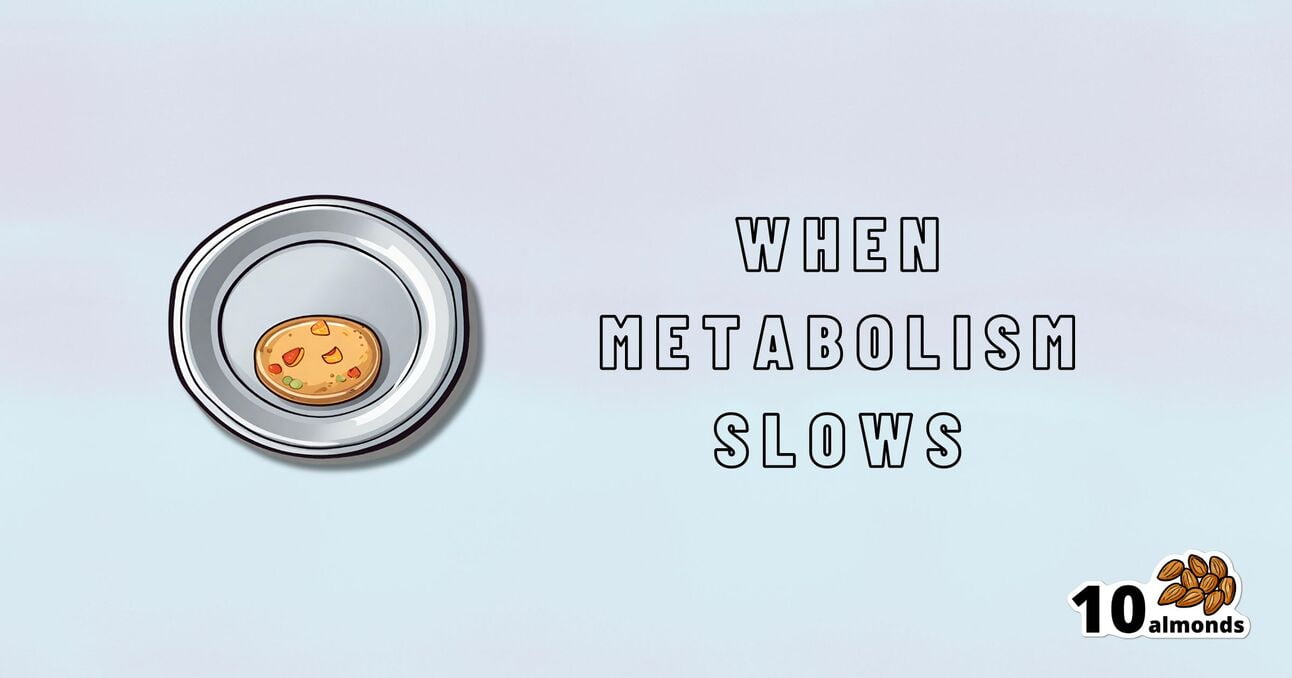Minimize Aging’s Metabolic Slump
Q&A Day at 10almonds: Dive into metabolism, hormone impacts by age, and actionable tips for diet, sleep, exercise, and hormone therapy. Your body, your rules—get informed!

It’s Q&A Day at 10almonds!
Have a question or a request? We love to hear from you!
In cases where we’ve already covered something, we might link to what we wrote before, but will always be happy to revisit any of our topics again in the future too—there’s always more to say!
As ever: if the question/request can be answered briefly, we’ll do it here in our Q&A Thursday edition. If not, we’ll make a main feature of it shortly afterwards!
So, no question/request too big or small 😎
❝I know that metabolism slows with age, are there any waypoints or things to look out for? I don’t know whether I should be eating less, or doing less, or taking some other approach entirely. What’s recommended?❞
Age and sex count for a lot with this one! As metabolism is in large part directed by hormones:
- For men, declining testosterone (often from around 45 onwards) can result in a metabolic slump
- For women, declining estrogen with the menopause does have an effect, but progesterone is the bigger factor for metabolism in the sense you are talking about.
In both cases, simply taking more of those hormones can often help, but please of course speak with an endocrinologist if that seems like a possible option for you, as your circumstances (and physiology) may vary.
If you’d like to go to that conversation well-armed with information, here are some good starting points, by the way:
- The Testosterone Drop, & Topping Up Testosterone
- Menopausal HRT: Bioidentical vs Animal (It Makes A Difference!)
And if you’re wondering about the natural vs pharmaceutical approaches…
- What Does “Balance Your Hormones” Even Mean?
- What You Should Have Been Told About The Menopause Beforehand
About your metabolic base rate
We tend to think of “fast metabolism good, slow metabolism bad”, and that’s a reasonable general premise… but it’s not necessarily always so.
After all, if you could double your metabolism and keep it there all the time, without changing anything else, well… You’ve heard the phrase “burning the candle at both ends”? So, having at least some downtime is important too.
See for example: Sleep Deprivation & Diabetes Risk
What’s critical, when it comes to base metabolic rate, is that your body must be capable of adequately processing what you are putting into it. Because if your body can’t keep up with the input, it’ll just start storing the excess chemical energy in the quickest and easiest way possible.
…which is a fast track to metabolic disorder in general and type 2 diabetes in particular. For more on the science and mechanics of this, see:
How To Prevent And Reverse Type 2 Diabetes
As for portion sizes…
Your body knows what you need, so listen to it. There is no external source of knowledge that can tell you how much food you need better than your own body itself can tell you.
You may be wondering “how exactly do I listen to my body, though?”, in which case, check out:
The Kitchen Doctor: Interoception & Mindful Eating
As for exercise…
When you exercise, your metabolic rate temporarily increases. After most kinds of exercise, your metabolism slumps again afterwards to compensate.
There are two ways to avoid this:
- Exercise Less, Move More ← it’s about maximizing time spent not sitting still
- High Intensity Interval Training ← a special kind of exercise, the only one known to keep the metabolism running high for a couple of hours afterwards, with no counter-slump
…which makes it pretty effective indeed 😎
Would you like this section to be bigger? If so, send us more questions!
Share This Post
Learn To Grow
Sign up for weekly gardening tips, product reviews and discounts.




